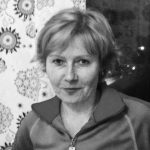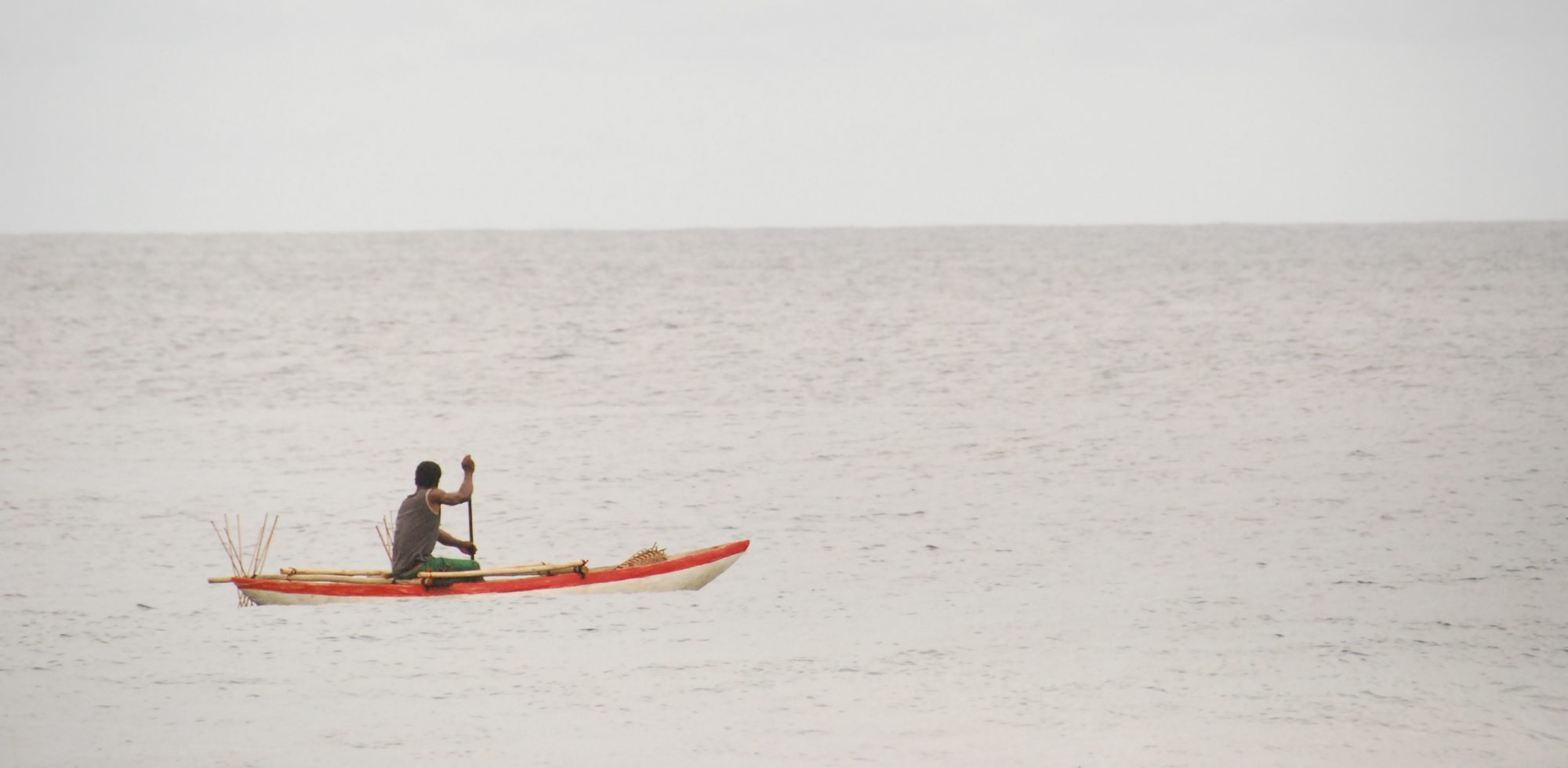Petra Autio, Ph.D.
E-mail: petra.autio(at)helsinki.fi
Petra Autio is currently working on a postdoctoral research project The I-Kiribati in New Zealand: Migrants and Language Ideology in the Context of Climate Change which is funded by the Finnish Cultural Foundation. She is working on Kiribati migration from two perspectives: a contemporary one, involving a Kiribati community in New Zealand, and a historical one, concerning migration – and lack thereof – in the Gilbert and Ellice Islands Colony, today known as Republic of Kiribati.
The former is based on interviews during a short fieldwork period in in a Kiribati community in New Zealand in 2018. The focus of research here are the practices and ideologies of maintaining Kiribati language and customs in New Zealand. The latter is based on material from the Kiribati National Archives, supplemented with other Gilbert and Ellice Islands Colony archival documents available online. Her interest lies in the colonial history of the resettlement and labour migration schemes, which underlies present-day discussions about climate change related relocation.
Besides the current keywords of migration, language and custom, Petra Autio’s research has concerned social organisation and differentiation, dance and oral traditions. Her PhD (2010) was an ethnography of a southern Kiribati community.
In addition, Petra Autio has worked in the Finnish Roma Association as well as in academic administration.
Phaedra Douzina-Bakalaki, Ph.D.
 E-mail: phaedra.douzina-bakalaki(at)helsinki.fi
E-mail: phaedra.douzina-bakalaki(at)helsinki.fi
Unioninkatu 40; Room A 138
P.O. Box 24
FI-00014 University of Helsinki
Phaedra Douzina-Bakalaki is a social anthropologist currently working on the Greek economic crisis. She has conducted long term ethnographic fieldwork in a soup kitchen, a clothing bank and a social clinic in the Northern Greek town of Xanthi. Her PhD thesis (University of Manchester) looks at emergent forms of collective and egalitarian sociality, engendered by the economic crisis, and their links with the state, the market and the domestic sphere.
In the past, Phaedra pursued a research interest on Islamic charity, and its significance within Turkey’s shifting sociopolitical landscape. Phaedra holds an MA and MRes in Social Anthropology (University of Manchester) and a BSc in Psychology (Goldsmiths, University of London). She is also a member of the Early Career Researchers’ Editorial Board of the Sociological Review.
Agnese Bankovska, Ph.D.
Email: agnese.bankovska(at)helsinki.fi
My doctoral project explored everyday politics and economies of food practices among the actors of the food movement of ‘tiešā pirkšana’ in Latvia. I seek how they are affected by bigger scale change in the food politics both locally and globally. Simultaneously as a junior researcher in the TRANSLINES project I look how different food practices serve as strategies for ‘doing family’ and help to overcome inequalities encountered by transnational Latvian-Finnish families.
My PhD project on an alternative food movement of ‘tiešā pirkšana’ was supervised by Dr. Katja Uusihakala and Prof. Sarah Green. The TRANSLINES project is funded by Academy of Finland and lead by Prof. Laura Assmuth, UEF.
I have obtained a master’s degree in anthropology at the Riga Stradins University in 2013. Previously I have been working in media and advertising for more than 10 years.
Key words: food research, family and kinship, gender, ethical eating, food systems, value(s), time, post-socialism, non-verbal methods.
Laia Soto Bermant, Ph.D.
E-mail: laia.sotobermant(at)helsinki.fi
Unioninkatu 40; Room A 138
P.O. Box 24
FI-00014 University of Helsinki
Laia Soto Bermant is a Post Doctoral researcher working for Transit, Trade, and Travel project. She earned her doctorate from the Institute of Social and Cultural Anthropology at the University of Oxford. After graduating, she held a postdoctoral scholarship at the School of Transborder Studies in Arizona State University, and a lectureship at Bournemouth University.
She has conducted fieldwork in Spain and Morocco since 2008, and she has a long-standing interest in the relationship between the northern and southern shores of the Mediterranean – particularly, in the connections and disconnections generated between the Iberian Peninsula and Morocco since the time of Al-Andalus (711-1492 AD). In Trade, Transit and Travel, she explores the relative location of a Spanish exclave located in north eastern Morocco: the city of Melilla, under Spanish sovereignty since the late 15th century and part of the Schengen space since the early 1990s. This research is linked to the ERC project on Cross-locations, but it is an independent project funded by the Academy of Finland.
Perpetual Crentsil, Ph.D.
Email: perpetual.crentsil(a)helsinki.fi, perpetual.crentsil(at)yahoo.com
tel +358 (0)40 575 4770
Perpetual Crentsil received her PhD at the Social and Cultural Anthropology, University of Helsinki in Finland in 2007. Her research interests include HIV/AIDS in Ghana (Africa), kinship, reproductive health, gender and sexuality, medical and belief systems in Africa. Her postdoctoral research has engaged her in topics such as mobile technology and health development in Africa, African migrants in Finland/Europe, migration and transnationalism, gambling, remittances and diaspora engagements. In 2014, she worked as a postdoctoral researcher (Senior Researcher) at the Nordic Africa Institute in Uppsala (Sweden) in her project: HIV and religion in Akan society (Ghana).
Matti Eräsaari, Ph.D.
Email: matti.erasaari(at)helsinki.fi
tel +358 (0)50 301 4095
Unioninkatu 35; Room 317
P.O. Box 18
FI-00014 University of Helsinki
Matti Eräsaari is a researcher currently working on the restrictive properties and world-making possibilities of different units and standards of value. He has a particular ethnographic focus on Fiji, but he also seeks to present his work in a way that makes comparison beyond the Fiji islands possible.
Eräsaari’s previous research project combined ideas from Fiji and Finland to highlight the role of time as an expression of value, ranging from monetary value to leisure, dignity, or boredom. Eräsaari’s research in general tends to deal with questions of value, for example phenomena such as taxes, accounting, money, food, drink, leadership, or ritual elaboration. He has carried out field research in Fiji since 2003. He is the author of We Are the Originals: A Study of Value in Fiji and the co-editor of Ruoan kulttuuri, a Finnish-language volume on the anthropology of food.
Eräsaari got his PhD in social and cultural anthropology at the University of Helsinki in 2013 and has subsequently worked as a Newton International Fellow in Social Anthropology at the University of Manchester (2015–17) and as an Academy of Finland Post-Doc at the University of Helsinki (2017–2020).
Andrew Graan, Ph.D.
Email: andrew.graan(at)helsinki.fi
Unioninkatu 35; Room 214
P.O. Box 18
FI-00014 University of Helsinki
Andrew Graan is a Researcher in Social and Cultural Anthropology at the University of Helsinki. A cultural and linguistic anthropologist, his research interests center on: the “project” as a social form, publics and the publics sphere, language and politics; nation branding and neoliberal governance; and post-conflict intervention in Macedonia and the Balkans. He earned his PhD in anthropology from the University of Chicago in 2010. His current research on, “Brand Nationalism: Neoliberal Statecraft and the Politics of Nation Branding in Macedonia,” is sponsored by the Kone Foundation and the Finnish Cultural Foundation. It examines how the coordinated efforts to regulate public communication that are found in nation branding projects constitute a wider program of economic and social governance. Beginning in January 2023, he will join the Helsinki Collegium for Advanced Studies as a Core Fellow, to work on “Project Lessons: An Inquiry into the Past, Present, and Future of the Project Form.” His work has appeared in Cultural Anthropology, Signs & Society, Slavic Review, HAU, the Journal of Linguistic Anthropology, the Journal of Cultural Economy, among other places. He currently serves as the convenor of European Association of Social Anthropologists’ Linguistic Anthropology Network.
Personal Webpage
TUHAT
Academia.edu
ResearchGate
Saana Hansen, Ph.D.
Email: saana.hansen(at)helsinki.fi
tel. +358 44 569 4807
Unioninkatu 35; Room 212
P.O. Box 18
FI-00014 University of Helsinki
Saana Hansen works as a post-doctoral researcher at the University of Helsinki. Together with Katja Uusihakala and Hanna Rask she works in a Kone Foundation funded project Postcolonial Apology and Legacies of Problematic Pasts: Comparative study on reconciliation processes regarding children’s forced removal, migration and childcare regimes (2021-2026). Saana’s project investigates postcolonial modernization interventions by the Danish state into the lives of Greenlandic families, and subsequent claims for compensation and apology. The research focuses particularly on various childcare ‘welfare’ regimes and intertwined practices that displaced Greenlandic children from their kin and emplaced them into Danish families.
Starting in 2024, Saana also works together with Maarit Forde, Florence Ncube and Amilcár Sanatar in a multi-sited, collaborative project Imagining futures in the margins of the state: everyday politics in urban communities in Trinidad and Zimbabwe (link to the project site).
Saana received her PhD in Social and Cultural Anthropology at the University of Helsinki in 2023. Her Doctoral dissertation Economies of Care and the Politics of Return: Sustaining Life among Injivas and their Families in Bulawayo, Zimbabwe explored the practices and relations of care between Zimbabwean low-income return migrants, their intimate and public social networks. The dissertation was granted a Distinction.
Saana’s research interests revolve around mobility and displacement, economies of care, kinship and state, documents and citizen certification, affects and violence, compensation and apology, colonial and postcolonial child welfare policies. Her regional interests are in southern Africa and northern Europe.
Email: elina.hartikainen(at)helsinki.fi
Unioninkatu 35; Room 214
P.O. Box 18
FI-00014 University of Helsinki
Elina I. Hartikainen is Associate Professor in Anthropology at the University of Oslo. Her research examines the intersection of religion, politics, law, and race in Brazil through a focus on religions of African origins. In her past and current research, she has explored this conjuncture through the analysis of the Candomblé religion’s practitioners’ activist engagements with Brazilian state projects of participatory democracy and multiculturalism in Salvador, Brazil.
In 2023-2024, she is also a Visiting Scholar in Anthropology at the University of Helsinki. As Visiting Scholar she will work to conclude her Academy of Finland funded (2019-2024) research project “Secularism at the Intersection of Race and Religion: Afro-Brazilian Religions and the Prosecution of Religious Intolerance in 21stCentury Brazil.” The research project examines how the wide-spread adoption of “multicultural legal instruments” in Brazil has influenced efforts to prosecute acts of religious intolerance against Afro-Brazilian religions in the city of Rio de Janeiro in order to develop an anthropological understanding of the intersectional construction of religion and race in secular governance and law. Theoretically and methodologically, her research draws on a combination of socio-cultural and linguistic anthropological approaches to political and legal processes.
Elina holds a PhD in Anthropology from the University of Chicago, and MAs in Anthropology from the University of Helsinki and Social Sciences and Anthropology from the University of Chicago. Previously, she has worked as an Academy Research Fellow (akatemiatutkija) in Social and Cultural Anthropology at the University of Helsinki (2019-2023), a Core Fellow at the Helsinki Collegium for Advanced Studies (2016-2019), and Earl S. Johnson Instructor in Anthropology in the University of Chicago’s Master of Arts Program in the Social Sciences (2013-2016).
She has served as editor of Suomen Antropologi: The Journal of the Finnish Anthropological Society (2017-2020), board member of the Finnish Anthropological Society (2018-2021), and coordinator of the ELAN (European Association for Social Anthropology Linguistic Anthropology Network) works-in-progress workshop series (2020-2021). Currently, she is a member of the editorial board of the journal PoLAR: Political Anthropology Review, and the scientific board of Conexões e Ideias, a book series of Editora Hucitec.
Heidi Härkönen, Ph.D. 
Email: heidi.harkonen(at)helsinki.fi
Heidi Härkönen is an Academy of Finland Postdoctoral Researcher. Her current research project, “Wellbeing and Social Change: Body, Personhood and Care” examines understandings and practices of well-being in Cuba amidst the island’s contemporary political and economic changes. She has conducted ethnographic research in Cuba since 2003. Her previous research has examined kinship, gender, sexuality, life cycle and the state. She is the author of Kinship, Love and Life Cycle in Contemporary Havana, Cuba: To Not Die Alone (Palgrave McMillan 2016). She has been a visiting research scholar at the City University of New York Graduate Center, a visiting post-doctoral researcher at the University of Amsterdam and a visiting Anthropology lecturer at the University of Havana. She gained her PhD in social and cultural anthropology at the University of Helsinki in 2014.
Sonja Koski, Ph.D., docent
Email: sonja.koska(at)helsinki.fi
Sonja Koski is a biological anthropologist working on understanding how human particularities as a primate evolved. Her past research has addressed various phenomena in social dynamics of primates, such as conflicts and their resolution, friendship, cooperation, causes and consequences of personality, and emotional states underlying interaction. These topics she has studied in chimpanzees, marmoset monkeys, and macaques.
In more recent years, she has focused on topics that have a particular position as arguably being unique to humans, namely intersubjectivity and empathy. This has required a broader scope, so she has collaborated with psychologists, linguists, and sociologists to achieve a more bird’s eye view on these broad and complex themes. Such a cross-disciplinary approach led to her latest research project, which focuses on interspecies cooperation and communication. More specifically, she currently has a four-year research project on horse – human interaction, funded by Kone Foundation. The project incorporates several disciplines and methods ranging from fundamental behavioural biology to animal welfare science, comparative psychology, and social sciences. It centres around the question of whether acknowledging individual characteristics of the horse improves cooperation with the horse as well as the emotional response of both horses and their human partners. We approach this question from multiple angles, doing research on e.g. young horses’ learning and emotions during cooperation, the influence of social environment on adult horses’ personality, and human partners’ experience of meaningfulness and compassion due to interaction with horses.
In addition, she has ongoing collaborations with researchers in Zurich, Vienna, Utrecht, and Cambridge Universities on various themes broadly under the umbrella of primate social interactions, emotions, and cognition, and with Turku University’s Human Evolution research group headed by Prof. Virpi Lummaa.
Anu Lounela, Ph.D.
Email: anu.lounela(at)helsinki.fi
tel +358 2941 21681 / + 358 50 448 4251
Swedish School of Social Science
Snellmaninkatu 12 (room 351)
P.O. Box 16
FI-00014 University of Helsinki
Anu Lounela, PhD (University of Helsinki, 2009), is an anthropologist, University researcher in Development Studies, and Principal Investigator in Social and Cultural Anthropology, University of Helsinki. She is the Principal Investigator for the research project “New regimes of commodification and state formation on the resource frontier of Southeast Asia” (Kone Foundation, 2018-2022), together with Tuomas Tammisto, and University researcher for the research project “Water and Vulnerability in Fragile Societies” together with Anja Nygren and Mira Käkönen (Academy of Finland, 2018-2022).
Her research explores values and environmental and political changes in Central Kalimantan. Forest fires have become recurrent disasters, degrading sacred local forests and rubber and fruit gardens, and opening space for new commodity regimes. Lounela explores how state formation and commodity value production entangle within the socionatural landscape production at different scales, but in a specific location.
Her post-doctoral research has paid special attention to values and human-nature relations in the severely degraded swamp forest landscape that is prone to fires and floods, and how local populations reason their claims in the dispute over climate change schemes across different scales. She expands this topic in her research on water and vulnerability in degraded swamp forest landscape in Central Kalimantan through the current research projects.
Her research interests include state formation, nature-people relations, value, dispute, climate change and ethnographic specialization is in Indonesia on the islands of Java and Borneo.
Rodolfo Maggio, Ph.D.
Rodolfo Maggio is a social anthropologist of moral and economic values in the Asia-Pacific region. He conducted ethnographic research in Solomon Islands with a focus on how people use their cultural creativity to solve moral and economic dilemmas in their daily lives.
After receiving his PhD from the University of Manchester in 2014, Rodolfo worked as a Postdoctoral Researcher at the University of Oxford for three years. His focus on morality deepened with an ethnographic research on daily negotiations about the value of kinship, parenting, and the meaning of a good life.
Eager to broaden his scope beyond Western anthropological traditions, in 2019 Rodolfo spent one year in Japan researching ethnographies of the Pacific written by Japanese anthropologists, thanks to a generous grant from the Japanese Society for the Promotion of Science. This experience led him to research the influence of Eastern Asian cultures on moral and economic negotiations in the Pacific, especially in daily interactions.
In his free time, Rodolfo likes long swims in the sea, long runs in the nature, and riding his road bike.
Lalli Metsola, Ph.D.
Email: lalli.metsola(at)helsinki.fi
tel +358 (0)50 596 1115
Unioninkatu 35; Room 317
P.O. Box 18
FI-00014 University of Helsinki
Lalli Metsola is an Academy of Finland Research Fellow. His current project “Social infrastructuring and everyday governance at southern African precarious urban fringes” deals with how the necessity of the inhabitants to satisfy basic needs in the domains of residence, water, energy, and sanitation at the “informal settlements” of Windhoek, Namibia’s capital, involves relations among the residents, with various authorities, and between off-the-grid solutions and networked infrastructures, and how this contributes to the formation of city space, everyday governance, and urban politics. Previously, he has conducted research on claims and responses related to land, housing and basic services, and their institutional consequences in Namibia and Botswana. His PhD was an ethnography of Namibian ex-combatant and veteran politics.
Suvi Rautio, Ph.D.
Email: suvi.rautio(at)helsinki.fi
Unioninkatu 35; Room 214
P.O. Box 18
FI-00014 University of Helsinki
Suvi Rautio is a social and cultural anthropologist specialising on China. Her PhD thesis, “The Jade Emperor’s Last Taste of Water: An ethnography on the making of a village in China” (University of Helsinki, 2019), draws on her ethnography in a Dong ethnic minority village in Southwest China to reveal the incongruences and layers of social difference that characterise rural China today.
Suvi’s postdoctoral project, “Forgotten Dreams of Mao’s Ousted Class: An Intimate Ethnography on how the Chinese Intelligentsia Survived the Mao Zedong Era” contributes to scholarly discussions on transmissions of memory and loss in contemporary Chinese history. The project is an intimate ethnography in that it is narrated through the recollected biographies of Suvi’s own family and the role they played in a community of the intellectual class in one of the top universities of Beijing during the Maoist era (1949-1976). In a novel enquiry to re-conceptualize how collective memory is transmitted, “Forgotten Dreams of Mao’s Ousted Class” reconsiders what lurks beneath the nation’s autocratically monitored socialist dream that holds post-Mao Chinese society together.
Suvi has also conducted fieldwork and written about how shifting geopolitical structures have direct consequences for young people’s mobility across Africa and China through the lens of African popular dance (liuxing feizhou wu) teachers in Guangzhou.
Suvi Rautio received her BA in Psychology and Sociology at the University of Glasgow in 2007 and MSc in Sociology at the London School of Economics and Political Science in 2010. She has lived most of her life in Beijing and in between her university degrees she worked in the communication sector for Chinese and transnational environmental organisations in Beijing.
Patricia Scalco, Ph.D.
E-mail: patricia.scalco(at)helsinki.fi
Unioninkatu 40; Room A 138
P.O. Box 24
FI-00014 University of Helsinki
Patricia D. Scalco is a social anthropologist and a postdoctoral researcher within the Trade, Transit and Travel project under the Academy of Finland. She earned her PhD from the University of Manchester and her doctoral research, currently being transformed into a monograph, explored the role of sexual moralities in the delineation of private and public spaces in contemporary Istanbul. Under the TTT project, she will further explore constructions of space and place in the area of the Grand Bazaar, in Istanbul.
Patricia has lived and conducted extensive fieldwork in Istanbul since 2006, earning her MA in Social Anthropology from Yeditepe University. She is an Early Career Researcher member of the Editorial Board of the Sociological Review and a fellow at the Netherlands Institute of Turkey. A dual citizen of Brazil and Italy, Patricia holds a degree in Law and is affiliated with the Brazilian Bar Association.
Tuomas Tammisto, Ph.D.
Email: tuomas.tammisto(at)helsinki.fi
Snellmaninkatu 14 C
P. O. Box 54
FI-00014 University of Helsinki
tel +358 45 630 1938
Tuomas Tammisto is a socio-cultural anthropologist specializing in environmental issues, political ecology and Papua New Guinea. In his PhD earned form the University of Helsinki, Tammisto looked at how the Mengen people in the rural Pomio District of Papua New Guinea engaged in swidden horticulture, logging, wage labour on plantations and community conservation. Tammisto conducted postdoctoral research on the relationship between the commodification of nature and state formation on so called frontier areas in the project New Regimes of Commodification and State Formation on the Resource Frontier of Southeast Asia (2018–2021) examining how the expansion of oil palm plantations in Pomio is linked to different processes of state formation, territorialization and value creation. In his current research project Roads, natural resources and spatialized power, Tammisto examines how local people, international consultants and extractive companies engage in state-formation through road projects in Papua New Guinea.
Tammisto is currently the editor-in-chief of Suomen antropologi: The Journal of Finnish Anthropological Society together with Heikki Wilenius. Tammisto is the co-editor of the volumes Ympäristö ja kulttuuri (2012) and Valtion antropologiaa (2021), Finnish language works on environmental and political anthropology.
Keywords: agriculture, class, environment, infrastructure, place and space, kinship, land use, natural resources, political ecology, political economy, production, state formation, value
Pekka Tuominen, Ph.D.
Email: pekka.tuominen(at)helsinki.fi
I am a social and cultural anthropologist, specializing on contemporary Turkey.
In my research, concentrated on Istanbul’s district of Beyoğlu, I explore how different senses of belonging, contextual moral frameworks and symbolic boundaries in rapidly transforming localities are related to the historical consciousness of Istanbul’s inhabitants and how these dimensions are related to reproduction of its urbanity.
I have studied ethnographically, how significant places in Istanbul carry different meanings to people, how certain streets have become to act as symbolic boundaries within the city and how the notions of public space and the spatial makeup of the city are rapidly changing through ideologically motivated discourses of appropriate social values, appearances and practices.
In addition, I have been working in multidisciplinary projects, involving scholars of urban studies, artists and designers, dealing with the questions of future developments of the urban sphere. I am currently conducting post-doctoral research in the Kontula district of Helsinki, studying the urban transformation of the area and examining new possibilities of participatory urban culture connecting its neighbourhoods.
Katja Uusihakala, Ph.D.
Email: katja.uusihakala(at)helsinki.fi
tel +358 2941 23252
Unioninkatu 35; Room 209
P.O. Box 18
FI-00014 University of Helsinki
Katja Uusihakala is a university researcher, who works as the PI of a Kone Foundation funded research project Postcolonial Apology and the Legacies of Problematic Pasts: Comparative study on reconciliation processes regarding children’s forced removal, migration and childcare regimes. The three ethnographic case studies in the project focus on childcare policies, which went hand in hand with political pursuits of strengthening colonial order and national strategies of cultural assimilation. Katja’s own case study concerns the 2010 state apology to British child migrants and the reconciliation processes that have followed it since. https://blogs.helsinki.fi/postcolonial-apology/
The collaborative project stems from Katja’s previous research project Children as Imperial Investments: British child migration to colonial Southern Rhodesia, which was funded by the Academy of Finland, and in which Katja worked as an Academy fellow. The study focuses on British postwar child migration and brings together discussions on memory and silencing, migration and displacement, project temporalities, kin-making and un-making, children’s institutional socialization, politics of reconciliation and the formation of diasporic mnemonic communities.
Previously, her research has focused particularly on the study of colonial and postcolonial white settler communities, mainly of British background. In her PhD work she examined a diasporic community of white former “Rhodesians” in South Africa and studied their social memory practices. Her other research interests include the anthropology of food, especially issues related to food and memory, commensality and reciprocity, as well as the anthropology of heritage linked to heritage landscapes, memory politics, and questions of nostalgia.
Tea Virtanen, Ph.D.
Email: tea.virtanen(at)helsinki.fi
Siltavuorenpenger 1A, room 425
P.O. Box 9
FI-00014 University of Helsinki
Tea Virtanen is a senior researcher whose current research project “The Faithful on the Margin” aims at exploring the process of cultural humiliation and the ethically informed choices that it triggers among the Muslim Mbororo (Fulani) of Cameroon. The study focuses on the recent mass entry of the Mbororo into the Senegalese Islamic Sufi movement called Fayda Tijaniyya, looking at the movement as an ethical space for the Mbororo for handling and transcending the omnipresent sense of unfitness and humiliation. She is also working on a book manuscript, titled “Mbororo youth dance, value and power in Cameroon”, which examines the wider processes of social change among the Mbororo as reflected in the contradictory developments that their traditional youth dance has gone through during the recent decades.
Tea Virtanen is currently a member of a research group “Religion, Self and the Ethical Life,” funded by the Kone Foundation and the Academy of Finland. She has worked as a lecturer of Cultural Anthropology at the University of Joensuu (2002-2005), as a researcher at the Nordic Africa Institute in Uppsala (2010-2013), and as a Finnish Academy research fellow at the University of Helsinki (2013-2018).
Tea Virtanen’s research interests include pastoral people’s life-worlds, ritual and performance, dance, local expressions of Islamic religiosity, rural-urban dynamics, and popular conceptualization of indigeneity. Geographically she is specialized in West and Central Africa, especially Cameroon.

